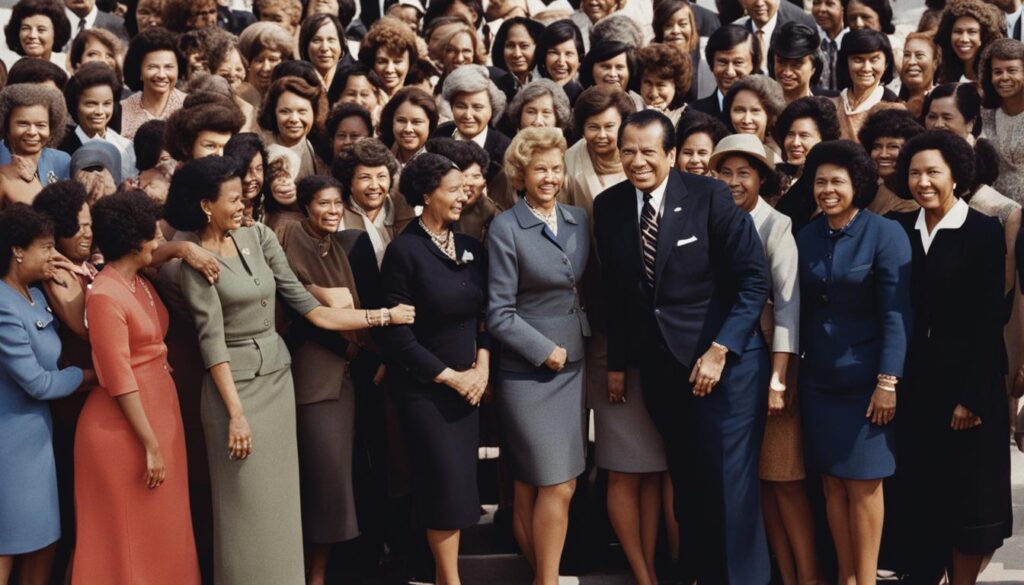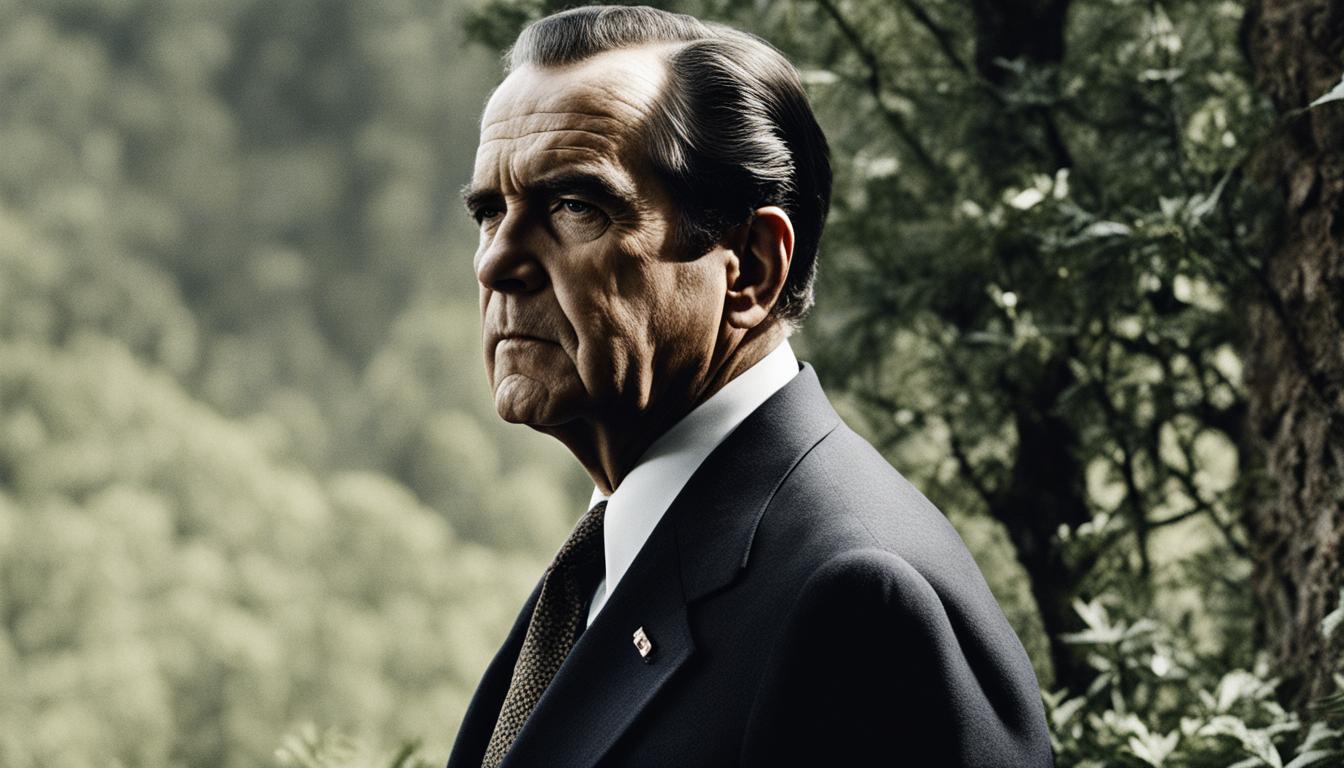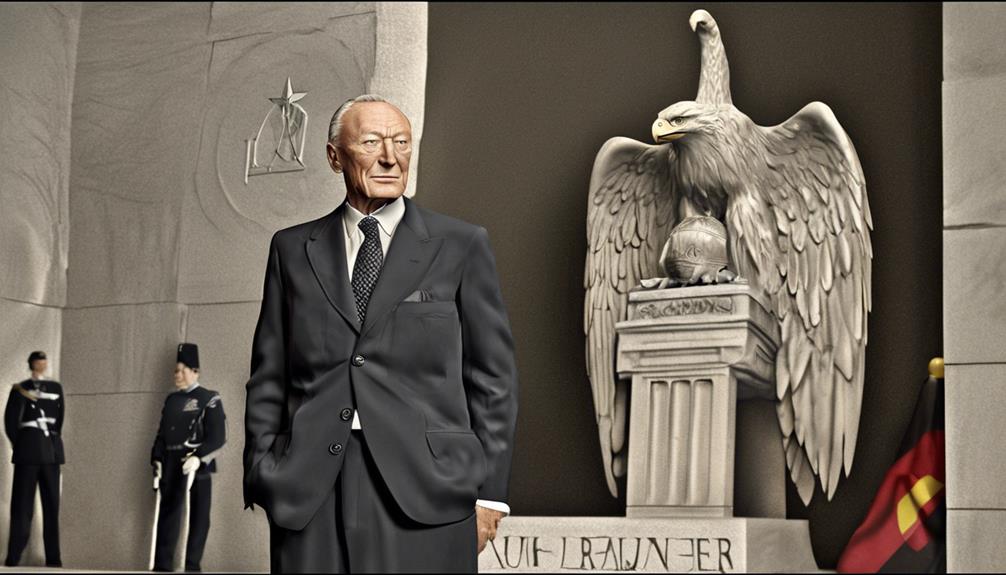Join us as we delve into the memorable quotes from Richard Nixon. Nixon stands out in American political history as the 37th President of the United States. During his lifetime and throughout his career, he imparted significant wisdom on topics such as perseverance, diplomacy, leadership, and personal development. His words have woven themselves into the fabric of our collective consciousness, providing insight into his personality and the period of history he influenced.
Key Takeaways:
- Richard Nixon’s quotes provide valuable insights into leadership, perseverance, diplomacy, and personal growth.
- His quotes reflect his accomplishments, challenges, and the complex legacy he left behind.
- Understanding Nixon’s quotes offers a deeper understanding of his character and the era in which he lived.
- His beliefs in taking risks, not giving up, and recognizing the support of ordinary Americans are evident in his quotes.
- Nixon’s support for women’s rights, environmental conservation, and international diplomacy are reflected in his quotes.
Rising over Adversity and Perseverance
In Richard Nixon’s journey, his quotes on perseverance stand as a testament to his ability to overcome adversity and achieve success. Nixon firmly believed that in order to achieve victories, one must be willing to take risks and never give up, even in the face of defeat. His quotes on perseverance showcase his resilience and determination throughout his life.
“Defeat doesn’t finish a man, quitting does. A man is not finished when he’s defeated. He’s finished when he quits.”
This quote encapsulates Nixon’s unwavering spirit and refusal to let setbacks define him. He understood that failures are not the end, but rather opportunities for growth and eventual triumph. Nixon’s ability to rise above adversity is a testament to his character and unwavering commitment to achieving his goals.
“The finest steel has to go through the hottest fire.”
This quote reflects Nixon’s belief that challenges and difficult times are necessary for personal growth and ultimate success. Like steel being molded and strengthened by intense heat, Nixon understood that enduring hardships and remaining steadfast in the face of adversity were essential for personal and professional development.
Nixon’s quotes on perseverance serve as a reminder that true success is not solely determined by victories, but by the ability to persevere and rise above the challenges that come our way. It is through perseverance that we find the strength to overcome obstacles and unlock our fullest potential.
The Silent Majority and Middle America
Nixon coined the term “silent majority” in one of his speeches, highlighting his belief in the critical support of Middle America. These Richard Nixon quotes on politics shed light on his perspective on politics and the importance of recognizing the support of ordinary Americans.
“And so tonight—to you, the great silent majority of my fellow Americans—I ask for your support. I pledged in my campaign for the presidency to end the war in a way that we could win the peace. I have initiated a plan of action which will enable me to keep that pledge.”
“I do not believe that I should devote an hour or a day of my time to any personal partisan causes or unnecessary controversy. I owe it to my family, to the Majority Leader, to the Senate, to you and to my fellow Americans to do my best.”
- These quotes highlight Nixon’s understanding of the importance of Middle America in shaping political outcomes.
- Nixon recognized the significance of appealing to the silent majority for their support.
- His speeches aimed to unite the nation and garner backing from ordinary Americans.
Middle America and Political Support
Nixon’s recognition of Middle America’s support played a significant role in his political strategy. By acknowledging their voices and concerns, Nixon aimed to bridge the gap between the government and the people. His belief in the silent majority resonated with many Americans who felt their values were not being represented by the vocal minority.
Peace with Honor
Nixon’s vision for peace and his understanding of history played a crucial role in ending the Vietnam War. His quotes on peace and history capture the significance of the Paris Peace Accords and the release of prisoners of war, marking pivotal moments in American history.
“Peace is the ultimate goal we seek, not just in the 1970s but in the 1980s as well…a truly lasting peace with honor.”
These words resonate with the sentiment of the time, reflecting Nixon’s commitment to achieving a lasting peace in Vietnam. Through diplomatic negotiations, he sought to end the war while ensuring the honor and dignity of the United States and its allies.
By negotiating a peace settlement, Nixon sought to bring an end to the bloodshed and division that had plagued the nation. His efforts in pursuing peace with honor were not without controversy, but they contributed to the eventual restoration of diplomatic relations between the United States and Vietnam.
Through his quotes on history and peace, Nixon highlights the importance of learning from the past and striving for a better future. The Vietnam War became a defining chapter in American history, and Nixon’s role in ending the conflict shaped his presidential legacy.
Breaking Barriers and Women’s Rights
Richard Nixon was a strong advocate for women’s rights and equality. He firmly believed that women should have the same political opportunities as men, and his actions reflected this belief. One significant step Nixon took towards achieving gender equality was his signing of Title IX, which aimed to eliminate discrimination based on sex in education and sports programs.
This commitment to women’s rights is evident in Nixon’s quotes on integrity and gender equality, showcasing his belief in the importance of creating a level playing field for all. One of his notable quotes on integrity states, “The finest steel has to go through the hottest fire.” This quote emphasizes the notion that facing challenges head-on and maintaining integrity in the face of adversity is essential to achieve lasting change.
“The finest steel has to go through the hottest fire.”
Nixon understood that breaking barriers and promoting women’s rights required resilience, determination, and unwavering integrity. His dedication to empowering women and challenging societal norms is further highlighted in his quote, “Women have fought their way into political life, and they’re not going to be denied into the important areas of politics and government, no matter what anybody else thinks about it.” This quote encapsulates Nixon’s belief in the equal political participation of women.
“Women have fought their way into political life, and they’re not going to be denied into the important areas of politics and government, no matter what anybody else thinks about it.”
Nixon recognized that true progress is achieved by breaking barriers and challenging the status quo. By prioritizing women’s rights and signing legislation like Title IX, he played a significant role in advancing gender equality in the United States.

Richard Nixon’s quotes on integrity and women’s rights are emblematic of his commitment to creating a more equitable society. His actions and words paved the way for progress in the fight for gender equality, leaving a lasting impact on the rights and opportunities available to women in the United States.
Controversy and Leadership
Richard Nixon firmly believed that leadership necessitates the willingness to embrace controversy and stand up for one’s beliefs. He understood that effective leaders must take decisive actions, even if they elicit criticism from others. Nixon’s quotes on leadership and controversy showcase his unwavering commitment to leading with conviction and making difficult decisions in the face of opposition.
“Leadership is the ability to get men to do what they don’t want to do and like it.”
This quote exemplifies Nixon’s understanding that leadership requires challenging individuals to step out of their comfort zones and embrace actions that may initially be met with resistance. He believed that true leaders have the power to motivate others to accomplish tasks they may not initially be enthusiastic about, ultimately achieving collective success.
Nixon’s leadership style was characterized by his willingness to tackle contentious issues and confront challenges head-on. He recognized that avoiding controversy could lead to stagnation and a lack of progress. Instead, he embraced controversial decisions, knowing that they were often necessary to achieve meaningful change.
“Only if you have been in the deepest valley can you ever know how magnificent it is to be on the highest mountain.”
This powerful quote speaks to Nixon’s belief in the transformative power of overcoming adversity. He understood that facing controversy and navigating challenging circumstances could ultimately lead to personal growth and achievement. Nixon’s own experiences with controversy and resilience shaped his leadership style, inspiring him to persevere during difficult times.
In his presidency, Nixon tackled numerous controversial issues, including the Vietnam War, the Watergate scandal, and civil rights. While these moments were undoubtedly challenging, Nixon remained steadfast in his commitment to making tough decisions that he believed would ultimately benefit the nation.
By embracing controversy and making difficult choices, Nixon demonstrated his leadership qualities and left a lasting impact on American politics and history. His quotes on leadership and controversy serve as a reminder that effective leadership often demands taking principled stands, even when they may be met with opposition.
Individualism and the American Spirit
Nixon’s quotes on success and individualism highlight the significance of personal responsibility and the American spirit. He believed that the greatness of America stemmed from the collective efforts of its people, rather than relying solely on the government.
“The only limit to our realization of tomorrow will be our doubts of today. Let us move forward with strong and active faith.” – Richard Nixon
Nixon’s quote reminds us that success is within our reach, but it requires faith in our abilities and a proactive mindset. It emphasizes the importance of taking action and not letting doubt overshadow our dreams.
In addition to faith and action, Nixon also recognized the role of individual effort in achieving success:
- He said, “The strongest force driving us toward a better America is an appreciation for the value of individual freedom. Our individual freedom is the wellspring of progress; it is what has made this nation the haven for innovation and opportunity.”
- Nixon emphasized, “Remember, always give your best. Never get discouraged. Never be petty. Always remember, others may hate you, but those who hate you don’t win unless you hate them. And then you destroy yourself.”
Nixon believed that individuals, through their hard work, determination, and refusal to succumb to hatred or pettiness, could overcome any obstacle and achieve greatness.
To further solidify the importance of personal responsibility and the American spirit, here is an inspiring quote from Nixon:
“The greatness comes not when things go always good for you, but the greatness comes when you’re really tested, when you take some knocks, some disappointments, when sadness comes; because only if you’ve been in the deepest valley can you ever know how magnificent it is to be on the highest mountain.” – Richard Nixon
This quote showcases Nixon’s belief in the resilience of the American spirit. He recognized that true greatness is not achieved through an easy path but rather through overcoming challenges, disappointments, and setbacks. It is through these experiences that individuals can truly appreciate and savor the triumphs and successes in life.
Embracing personal responsibility, fostering an entrepreneurial mindset, and embodying the indomitable American spirit were core principles Nixon held dear. These quotes serve as a reminder of the power individuals possess to shape their own destinies and contribute to the progress and prosperity of the nation.

Building Bridges and Diplomacy
Nixon’s approach to international relations was guided by a belief in the power of negotiation and diplomacy. He sought to build bridges between nations, moving away from confrontation and towards peaceful resolutions. Through his diplomatic efforts, Nixon achieved significant breakthroughs with countries like China and the Soviet Union, reshaping the global political landscape.
“The finest hours of our presidency were an era of negotiation.”
Nixon understood that negotiation required patience, persistence, and the ability to find common ground. He viewed diplomacy as a tool for creating mutual understanding and fostering cooperation among nations. By engaging in dialogue and finding diplomatic solutions, Nixon aimed to strengthen diplomatic ties and promote peace on a global scale.
The Beijing Summit
One of Nixon’s most significant diplomatic achievements was his visit to China in 1972. This historic event, known as the Beijing Summit, marked the first time an American president had visited the People’s Republic of China since its formation. Nixon’s willingness to engage in direct negotiations with Chinese leaders, including Chairman Mao Zedong and Premier Zhou Enlai, paved the way for improved relations between the two nations.
“This was the week that changed the world.”
The Beijing Summit led to the establishment of formal diplomatic relations between the United States and China, opening up opportunities for economic cooperation and easing tensions during the Cold War era. Nixon’s commitment to diplomacy played a crucial role in shaping the geopolitical landscape and fostering peaceful relations between the two superpowers.
The Detente Era
Nixon’s diplomatic efforts extended beyond China. He also pursued a policy of détente with the Soviet Union, aiming to reduce tensions and promote cooperation between the two superpowers. Through strategic negotiations and dialogue, Nixon and his administration sought to prevent a potential nuclear conflict and create a more stable world order.
Nixon’s approach to diplomacy during the détente era culminated in the signing of several important treaties, such as the Strategic Arms Limitation Talks (SALT I) and the Anti-Ballistic Missile (ABM) Treaty. These agreements limited the growth of nuclear arsenals and established guidelines for arms control, contributing to the overall stability of the global nuclear landscape.
Diplomatic Legacy
Nixon’s emphasis on negotiation and diplomacy left a lasting impact on international relations. His approach to building bridges between nations, backed by his strong belief in the power of dialogue and understanding, set a precedent for future diplomatic efforts. Nixon’s diplomatic legacy serves as a reminder that peaceful resolutions can be achieved through negotiation, even in the face of complex global challenges.
Reflections on the Vietnam War
During the Vietnam War, Richard Nixon’s perspective on the conflict and his frustration with the media’s portrayal of it became evident. He believed that the war was often misrepresented and misunderstood, leading to misconceptions about its true nature and purpose. Nixon’s quotes on the Vietnam War shed light on his desire for a more accurate understanding of history and the need to challenge prevailing narratives.
“The Vietnam War has always been an enigma to the American people. It has been described as ‘the great failure,’ ‘a quagmire,’ ‘a senseless slaughter,’ ‘a crime.’ I believe these descriptions are wrong. I believe that our young men fought bravely and honorably in Vietnam. I believe that they fought for a cause that was just.”
In his speeches and writings, Nixon emphasized the bravery and honor of American soldiers who fought in Vietnam. He recognized their sacrifice and believed strongly in the justness of the cause for which they fought. These quotes reflect his deep respect for the troops and his frustration with the negative portrayal of their efforts.
Nixon’s frustration with the media also stemmed from what he saw as a failure to present a complete picture of the war. He believed that the focus on violence and casualties overshadowed the progress being made on the ground and obscured the enemy’s brutality.
“Too often, the media’s portrayal of the war has focused solely on the violence and suffering, without highlighting the atrocities committed by our enemies. We must not forget the thousands of innocent civilians who were subjected to unspeakable cruelty by the Viet Cong and North Vietnamese forces.”
These quotes illustrate Nixon’s belief in the need for a more balanced and accurate understanding of the Vietnam War. He wanted the American people to recognize the complexities of the conflict and the challenges faced by the US and its allies.
Inaccurate portrayals of the war perpetuated misconceptions, contributing to the growing anti-war sentiment. Nixon saw a lack of appreciation for the sacrifices made by American soldiers and sought to challenge prevailing narratives. He believed that a more complete understanding of the war was essential to fully grasp its significance in history.

In the next section, we will explore Richard Nixon’s reflections on success and perseverance, offering valuable insights into his personal and political journey.
Triumph over Challenges and Adversity
Richard Nixon’s quotes on success and perseverance highlight his belief in the importance of facing challenges and overcoming adversity. He understood that setbacks and disappointments are an inevitable part of life, but true greatness lies in how we navigate through them.
Remember, always give your best. Never get discouraged. Never be petty. Always remember, others may hate you. But those who hate you don’t win unless you hate them. And then you destroy yourself. – Richard Nixon
Nixon recognized that success requires perseverance and resilience. It is through perseverance that we find the strength to push forward, even when the odds are against us. His quotes inspire us to embrace challenges as opportunities for growth and not let setbacks define our future.
One of Nixon’s famous quotes encapsulates this mindset: “Defeat doesn’t finish a man—quit does. A man is not finished when he’s defeated. He’s finished when he quits”.
We must remember that success is not measured solely by achievements but also by the ability to learn from failures and come back stronger. Nixon’s quotes on success and perseverance remind us that overcoming challenges is what ultimately leads to triumph.
Richard Nixon’s Triumphs:
| Accomplishment | Impact |
|---|---|
| Ending the Vietnam War | Nixon’s diplomatic efforts resulted in the Paris Peace Accords, marking a pivotal moment in American history and bringing an end to the Vietnam War. |
| Opening Relations with China | Nixon’s visit to China in 1972 thawed the diplomatic relations between the United States and China and laid the foundation for future partnerships and trade agreements. |
| Establishing the Environmental Protection Agency | Nixon’s commitment to environmental conservation led to the creation of the EPA, which continues to protect and preserve the natural resources of the United States. |
| Signing the Title IX Education Amendments | Nixon’s support for gender equality in education resulted in the signing of Title IX, which opened doors for women in sports and academia. |
| Advancing Civil Rights Legislation | Nixon signed important civil rights legislation, including the Voting Rights Act Amendments of 1970 and the Equal Employment Opportunity Act of 1972, promoting equality and justice for all Americans. |
Regrets and Reflections on Watergate
Richard Nixon’s quotes on Watergate reveal his introspection and acknowledgment of mistakes. In his memoirs, Nixon dedicated a significant portion to addressing the scandal and expressed regret for not handling the situation more decisively. Let’s delve into some of Nixon’s quotes that provide insight into his thoughts on the Watergate scandal and its impact on his presidency.
“I regret not coming forward sooner and taking immediate action to address the wrongdoing that occurred during Watergate.”
Nixon’s quote demonstrates his remorse for not taking swift action to address the wrongdoings associated with the Watergate break-in. This acknowledgement highlights his understanding of the need for transparency and accountability in leadership.
“Watergate was a dark chapter in our nation’s history, and I deeply regret the pain and division it caused.”
By expressing regret for the pain and division caused by Watergate, Nixon acknowledges the negative impact the scandal had on the American people and the trust they placed in their government. This quote showcases his reflection on the consequences of such actions and the importance of integrity in public office.
“I failed to uphold the trust of the American people, and for that, I profoundly regret my actions during the Watergate scandal.”
This quote reveals Nixon’s recognition of his failure to uphold the trust bestowed upon him by the American people. He acknowledges the magnitude of his actions and accepts responsibility for the events that transpired, demonstrating a sense of accountability and remorse.
Overall, Nixon’s quotes on Watergate offer a glimpse into his reflections and regrets regarding the scandal. They reveal his introspective nature and his acknowledgment of the mistakes made during his presidency. Despite the controversy surrounding Watergate, these quotes provide insight into Nixon’s character and his understanding of the importance of transparency and integrity in leadership.
The Importance of Controversy in Leadership
Richard Nixon’s quotes on leadership reflect his understanding that controversy is often an integral part of effective leadership. As a leader, Nixon recognized that standing for something and making difficult decisions inherently invite opposition and controversy.
“Leadership is the ability to convince people to believe in something, even if it means facing controversy.”
Nixon believed that leaders who shy away from controversy are unlikely to achieve lasting and meaningful change. He understood that progress and transformation require taking bold actions that challenge the status quo. By embracing controversy, leaders have the opportunity to spearhead positive advancements and shape the course of history.
Furthermore, Nixon recognized that controversy tests a leader’s resolve and fortitude. It is in times of controversy that a leader’s true character shines through. The ability to navigate and lead through challenging circumstances is a testament to one’s strength and resilience.
Ultimately, Nixon’s quotes on controversy and leadership remind us that great leaders do not shy away from contentious issues. They embrace controversy as a catalyst for progress, understanding that it is through the resolution of challenges and the navigation of diverse opinions that true leadership emerges.
The Role of Controversy in Driving Change
Controversy has long been a driving force behind societal progress and change. When leaders tackle controversial issues head-on, they spark dialogue, challenge existing norms, and pave the way for transformative reforms. History has shown that controversy can be a catalyst for positive change, fueling a journey towards a better future.
| Positive Aspects of Controversy | Negative Aspects of Controversy |
|---|---|
|
|
While controversy can be uncomfortable and challenging, it is often necessary for societal growth. Leaders who navigate controversy with resilience and sensitivity have the power to shape a better future for their communities and society as a whole.
The Power of Sports and Competitive Spirit
Nixon’s beliefs extended beyond politics and leadership; he also valued the power of sports and the competitive spirit they fostered. He recognized that sports had the ability to shape character, instill discipline, and teach invaluable life lessons.
“I’ve always admired athletes. They have the ability to push themselves to the limit, to push past pain and exhaustion, and to never give up. Sports teach us the importance of perseverance, teamwork, and dedication. They challenge us to continually improve and strive for greatness.”
– Richard Nixon
Sports provide a platform to develop skills such as resilience, sportsmanship, and determination. Nixon saw sports as an avenue for personal growth and emphasized the role they played in shaping individuals.
The Life Lessons of Sports
In Nixon’s view, sports had the power to impart important life lessons. Whether it was being part of a team, coping with defeat, or striving for victory, these experiences taught individuals to navigate challenges and overcome obstacles.
- Teamwork: Sports reinforce the significance of collaboration and working towards a common goal. Nixon believed that teamwork was crucial not just in sports, but in all aspects of life.
- Resilience: Through sports, individuals learn to bounce back from setbacks and persevere in the face of adversity. Nixon recognized the importance of resilience in achieving long-term success.
- Sportsmanship: The competitive nature of sports also teaches valuable lessons about maintaining integrity, showing respect for opponents, and upholding ethical behavior. Nixon emphasized the role of sportsmanship in character development.
- Dedication: Sports require dedication, discipline, and hard work. Nixon admired athletes’ ability to commit themselves fully to their craft and saw dedication as a key ingredient for success.
The Impact of Sports in Society
Nixon understood that sports transcended individual achievements and had a significant impact on society as a whole.
- Inspiring Unity: Sporting events have the power to bring people together, fostering a sense of community and national pride. Nixon recognized their ability to unite people from different backgrounds and perspectives.
- Promoting Health: Sports encourage physical fitness and wellbeing. Nixon advocated for the importance of leading a healthy and active lifestyle, recognizing the positive effects of sports on personal and societal health.
The values and lessons learned through sports echoed Nixon’s own leadership philosophy. He believed that competition, determination, and the pursuit of excellence were key drivers of success, both on and off the field.

| Sport | Lesson |
|---|---|
| Basketball | Teamwork |
| Tennis | Individual resilience |
| Soccer | Integrity and sportsmanship |
| Baseball | Focus and dedication |
| Swimming | Endurance and discipline |
Environmental Conservation and Presidential Legacy
Contrary to popular belief, Richard Nixon was a strong advocate for environmental conservation. His quotes reflect his support for environmental protection and his significant contribution to establishing the Environmental Protection Agency (EPA) and enacting key environmental legislations.
“The environment should be put in the category of our national security. Defense of our resources is just as important as defense abroad. Otherwise, what is there to defend?”
Nixon recognized the importance of safeguarding our natural resources and understood that it was vital for the well-being and future of the nation. His dedication to environmental conservation is evident in his actions during his presidency.
Under Nixon’s leadership, the EPA was created in 1970 to address pressing environmental issues and coordinate efforts to protect air, water, and land. He believed in the need for proactive measures to prevent pollution and preserve the ecological balance for future generations.
Furthermore, Nixon played a crucial role in signing groundbreaking environmental legislations, such as the Clean Air Act (1970), which aimed to reduce air pollution, and the Clean Water Act (1972), which aimed to restore and maintain the quality of the nation’s water resources.
“The great challenge of the seventies is to arrest the deterioration in air quality, to halt the progressive fouling of our rivers and lakes, and to clean up our older, industrial areas. These national objectives require the cooperation of industry, labor, environmentalists, and government at all levels.”
Nixon understood that addressing environmental issues required collaboration among different stakeholders. He recognized the importance of bringing together industry, labor, environmentalists, and government to achieve tangible results.
Thanks to Nixon’s initiatives and his unwavering commitment to environmental conservation, numerous policies were established that continue to have a lasting impact on protecting and preserving our natural resources today.
In summary, Richard Nixon’s quotes on the environment and his significant contributions to environmental conservation through the establishment of the EPA and signing key legislations highlight his dedication to leaving a lasting presidential legacy in protecting the environment for the benefit of all Americans.
Insecurities and Humanity of Richard Nixon
Richard Nixon, known for his political career and leadership, possessed a vulnerable and human side that often went unnoticed. Through his quotes on personal life and relationships, we gain insight into the insecurities he faced, as well as his interactions with his closest allies and family.
“I have never been a handsome man, and I’ve always been troubled with a lack of confidence. The kind of man who had to work hard to get ahead.”
This candid quote reflects Nixon’s own perception of himself, revealing a depth of self-doubt and a constant drive to prove himself.
Insecurities Within Relationships
Nixon’s quotes on relationships shed light on the challenges he faced in maintaining connections, especially with his wife, Pat Nixon.
“The finest steel has to go through the hottest fire.”
This quote shows Nixon’s understanding that enduring difficulties in relationships can lead to strength and resilience. It highlights the struggles he and Pat faced together.
While Nixon had a complex relationship with the press and other politicians, his quotes reveal a desire for genuine connections:
“Always remember, others may hate you, but those who hate you don’t win unless you hate them, and then you destroy yourself.”
These words reflect Nixon’s belief in the destructive power of hatred. They demonstrate his understanding that fostering positive relationships is essential for personal well-being and success.
The Humanity Behind the Politics
Richard Nixon’s quotes provide a glimpse into the human side of a political figure often shrouded in controversy and scrutiny.
“The most important thing in life is to stop saying ‘I wish’ and start saying ‘I will.'”
This quote encapsulates Nixon’s determination to overcome personal and professional challenges. It reveals his human desire for self-improvement and achievement.
In his interaction with other politicians, Nixon expressed the complexities and uncertainties of political life:
“We cannot learn from one another until we stop shouting at one another – until we speak quietly enough so that our words can be heard as well as our voices.”
This quote showcases Nixon’s belief in the importance of open dialogue and listening, even in a divided political landscape. It illustrates his desire to find common ground despite differences.
By exploring Nixon’s personal quotes, we gain a deeper understanding of the man behind the politics. These glimpses into his insecurities and relationships serve as a reminder that even the most influential leaders are human, with their own vulnerabilities and complexities.

Conclusion
Richard Nixon’s quotations provide valuable insights into leadership, perseverance, diplomacy, and personal growth. These quotes reflect his accomplishments, challenges, and the complex legacy he left behind. Understanding Nixon’s quotes offers a deeper understanding of his character and the era in which he lived.
Nixon’s quotes on leadership showcase his belief in standing for something, even if it means facing controversy. He recognized that effective leadership requires taking risks and not shying away from criticism. His quotes on perseverance demonstrate his resilience and determination in the face of adversity.
Nixon’s quotes on diplomacy highlight his efforts to improve international relations and forge meaningful connections. His groundbreaking diplomatic breakthroughs with China and the Soviet Union have left a lasting impact on history. Furthermore, his quotes on personal growth and introspection reveal a human side to Nixon, offering a glimpse into his insecurities and regrets.
By exploring Richard Nixon’s quotations, we gain valuable insights into not only his character but also the socio-political climate of his time. These quotes serve as a reminder of the power of words and the lasting impact they can have on individuals and society. Nixon’s quotes continue to resonate, allowing us to reflect, learn, and grow as individuals and leaders.
What Insights Can We Gain from Sarah Palin’s Quotes in Comparison to Richard Nixon’s?
When comparing Sarah Palin’s quotes to Richard Nixon’s, it’s clear that both politicians had a unique way of addressing their audiences. Palin’s quotes often focused on patriotism and American values, while Nixon’s tended to be more strategic and calculated. Despite their differences, both speakers used their words to resonate with their supporters.
FAQ
What are some famous quotes by Richard Nixon?
Richard Nixon is known for his memorable quotes that provide valuable insights into leadership, integrity, and history. Some of his notable quotes include “The finest steel comes from the hottest fire,” “In the end, we will remember not the words of our enemies, but the silence of our friends,” and “The great leader accomplishes what the followers cannot.” These quotes reflect Nixon’s resilience, determination, and understanding of the challenges of leadership.
What did Richard Nixon believe about perseverance?
Richard Nixon believed that perseverance was essential for achieving victory. He famously said, “Defeat doesn’t finish a man, quit does. A man is not finished when he’s defeated. He’s finished when he quits.” Nixon understood that taking risks and not giving up, even in the face of defeat, were vital for success.
What is Richard Nixon’s perspective on politics?
Richard Nixon coined the term “silent majority” in one of his speeches, highlighting his belief in the critical support of Middle America. He understood the importance of recognizing the support of ordinary Americans and the need to address their concerns. Nixon’s quotes on politics shed light on his perspective and the challenges of gaining and maintaining public support.
How did Richard Nixon contribute to peace and history?
Richard Nixon played a significant role in ending the Vietnam War. The signing of the Paris Peace Accords and the release of prisoners of war were pivotal moments in American history. Nixon’s quotes on peace and history reflect his achievements and the sentiment of that time.
What was Richard Nixon’s stance on women’s rights?
Richard Nixon supported women’s rights and believed that women should have equal political opportunities as men. He signed Title IX, which aimed to eliminate discrimination based on sex and opened doors for women in sports, education, and other areas of society.
How did Richard Nixon view leadership?
Richard Nixon believed that effective leadership required being controversial and standing for something. He understood that taking a stand and being willing to face criticism were essential qualities of a leader. Nixon’s quotes on leadership encompass these key elements of his philosophy.
What did Richard Nixon believe about success and individualism?
Richard Nixon emphasized the importance of personal responsibility and the American spirit in achieving success. He believed that the greatness of America came from what people did for themselves and for each other, rather than relying solely on government. Nixon’s quotes on success and individualism capture these beliefs.
How did Richard Nixon approach negotiation and diplomacy?
Richard Nixon believed in moving away from confrontation towards negotiation in international relations. His efforts led to significant diplomatic breakthroughs with China, the Soviet Union, and other nations. Nixon’s quotes on negotiation and diplomacy showcase his approach and desire for improved international relations.
What did Richard Nixon think about the Vietnam War?
Richard Nixon held the view that the media misrepresented and misunderstood the Vietnam War. His quotes on the war reflect his frustration with these misconceptions and his desire for a more accurate understanding of history.
What did Richard Nixon believe about triumphing over challenges?
Richard Nixon believed that true greatness comes from facing challenges and overcoming adversity. He understood that setbacks and disappointments were part of the journey to success. Nixon’s quotes on triumph over challenges and perseverance demonstrate these beliefs.
How did Richard Nixon reflect on the Watergate scandal?
Richard Nixon expressed regret for not handling the Watergate situation more decisively. He dedicated a significant portion of his memoirs to the subject and acknowledged his mistakes. Nixon’s quotes on Watergate offer insights into his thoughts on the scandal and its impact on his presidency.
Why did Richard Nixon believe controversy was necessary in leadership?
Richard Nixon believed that controversy was often a necessary part of leadership. He understood that leaders who stand for something will inevitably face opposition and controversy. Nixon’s quotes on controversy shed light on his perspective and the challenges that come with taking a stand.
What did Richard Nixon think about the power of sports?
Richard Nixon recognized the power of competition and the lessons that can be learned from participating in sports. He saw sports as a way to build character and develop the will to win. Nixon’s quotes on sports highlight his belief in the transformative power of athletic endeavors.
Was Richard Nixon an advocate for environmental conservation?
Contrary to popular belief, Richard Nixon was an advocate for environmental conservation. He supported environmental protection and played a key role in establishing the Environmental Protection Agency and signing key environmental legislation. Nixon’s quotes on the environment reflect his commitment to preserving the natural world.
What do Richard Nixon’s quotes reveal about his personal life?
Richard Nixon’s quotes offer a glimpse into his personal life, including his insecurities, relationships with his wife and family, and interactions with other politicians. These quotes provide a more human perspective on Nixon beyond his political career.









